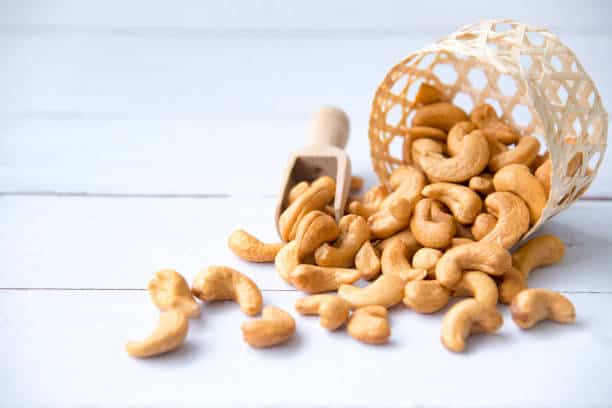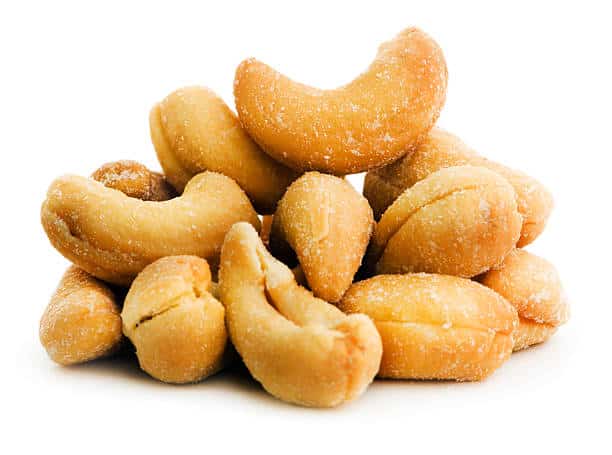Yes, dogs can eat cashews in moderation. Cashews are nutritious nuts that can provide your dog with protein and minerals. They should only be given to dogs as an occasional treat and in small quantities.
While cashews are generally safe for dogs, they are high in fat, which can lead to weight gain or digestive issues. Avoid salted or seasoned cashews, as the added flavors and spices can harm dogs.
Canine Nutrition and Cashews
Dogs are not just members of our families but also have specific dietary needs. One borrowed eating habit is the consumption of cashews, a nut rich in vitamins and minerals such as calcium, copper, fiber, iron, magnesium, manganese, and phosphorus. These valuable nutrients can contribute positively to canine health when given in moderation.
However, balancing this snack’s nutritional benefits with potential risks involves understanding both canine nutrition and what cashews bring to the table. Cashews contain higher fat levels than some other nuts, raising concerns about weight gain or obesity in dogs if overfed.
Particularly for small breeds or dogs prone to stomach upset or pancreatitis – a condition often sparked by digesting fats. it’s crucial to limit portion sizes when offering cashews as a treat.
While not toxic like macadamia nuts or those covered in chocolate or xylitol, these high-fat treats should be enjoyed sparingly. avoid feeding your dog salted cashews due to their sodium content, which might trigger water retention and possibly even seizures if consumed excessively.
Finally, while allergic reactions are rare, always watch closely for symptoms, including itching and swelling hives. After introducing any new food into your dog’s diet, consulting with the vet is advisable.
can dogs eat cashew nuts?
Cashews are a safe treat for dogs. However, moderation is key when feeding cashews to dogs due to their high-fat content. Overconsumption can lead to obesity and associated health issues.
Nuts should not be combined with other treats as they could pose a risk since certain types of nuts are harmful to dogs. Even though cashews harbor beneficial nutrients like antioxidants and fiber, their phosphorus could contribute to bladder stone formation.
Due caution must be exercised if your dog has any medical conditions or is on a prescription diet. Finally, always opt for unsalted and shelled cashew nuts since salted variants can cause water retention, leading to an elevated sodium intake that may result in vomiting or seizures.
Avoid giving chocolate-covered nuts because they pose toxicity risks for dogs.
can dogs eat salted cashews?
Feeding dogs salted cashews can lead to a host of health problems. Salted cashews bear an excessive sodium content, and while sodium is essential for your dog’s body functions, there’s always a risk of overdoing it.
Overconsumption can cause water retention and excessive fluid intake in dogs. This may result in vomiting, tremors, or even seizures. Always choose shelled, unsalted cashews over their salted counterparts.
Most importantly, avoid nuts products sweetened with xylitol or coated with chocolate – they are toxic to dogs.
can dogs eat raw cashews?
Raw cashews are safe for dogs. They provide several health benefits, including antioxidants, vitamins, healthy fats, minerals, fiber, and protein. Cashews contain nutrients like omega-6 fatty acids, promoting healthy skin and hair for your dog.
The low sugar content of raw cashews makes them a nutritious snack. However, excessive consumption can lead to weight gain and potential digestive issues.
Always practice portion control when feeding raw cashews to your canine companion.

Are Cashews Safe for Dogs? What Are The Risks?
Cashews are generally safe for dogs to consume, but it’s essential to be aware of potential allergic reactions and the risk of gastrointestinal issues.
Potential Allergic Reactions
Allergic reactions to cashews in dogs are rare. However, some dogs may develop an allergic response after consuming cashews, including itching, swelling, hives, or even difficulty breathing.
These symptoms could indicate an allergic reaction and should not be ignored. Seeking veterinary attention immediately for proper diagnosis and treatment is crucial.
The Risk of Gastrointestinal Issues
Excessive consumption of cashews can pose a risk of gastrointestinal issues for dogs. Due to their high-fat content, eating too many cashews can lead to stomach upset, diarrhea, and vomiting.
Dogs have different digestive systems than humans and may be unable to handle large amounts of fat. Phosphorus in cashews can contribute to forming bladder stones in some dogs.

Health Benefits of Cashews for Dogs
Cashews offer several health benefits for dogs, including antioxidants to support overall well-being, vitamins and minerals, healthy fats for a shiny coat, and fiber and protein for digestive health.
Antioxidants
Cashews are a delicious snack for humans and offer great health benefits for our four-legged friends. One of these benefits is their high content of antioxidants, which can help protect dogs’ cells from damage caused by harmful free radicals.
Antioxidants play a crucial role in supporting overall canine health. They can contribute to strong muscles, healthy skin and hair, and even aid in the prevention of chronic diseases like cancer.
Vitamins
Cashews are not only a tasty treat for your canine companion, but they also provide them with essential vitamins. These vitamins include vitamin B6, which helps support brain function and the production of red blood cells, and dietary fiber, which aids digestion and promotes a healthy gut.
Also, cashews contain low sugar content compared to other nuts and are rich in antioxidants that help protect your dog’s cells from damage caused by harmful free radicals.
Healthy Fats
Cashews contain healthy fats that can benefit dogs when consumed in moderation. These fats, including omega-6 fatty acids, provide essential nourishment for dogs, promoting the health of their skin and coat.
The healthy fats found in cashews contribute to maintaining strong muscles and supporting overall well-being. However, excessive consumption of cashews can lead to obesity in dogs due to their high-fat content.
Minerals
Cashews are rich in vitamins and healthy fats and contain essential minerals that can benefit your dog’s health.
Cashews provide calcium, copper, magnesium, iron, manganese, phosphorus, and zinc minerals. These minerals are crucial in maintaining strong bones and teeth, supporting proper muscle function, aiding in optimal blood circulation and oxygen transport, promoting a healthy immune system response, and facilitating enzymatic reactions.
Including cashews as a part of your dog’s balanced diet can help ensure they receive these essential minerals alongside other vital nutrients for their well-being.
Fiber and Protein
Cashews are not only a tasty snack for humans but can also provide some health benefits to dogs. Cashews are rich in fiber and protein, essential nutrients for your dog’s overall well-being.
Fiber helps regulate your dog’s digestion, promoting healthy bowel movements and preventing constipation. It also aids in weight management by making them feel full without adding excessive calories.
Protein is crucial for building strong muscles and maintaining healthy skin and hair in dogs. Including cashews as an occasional treat can be a nutritious addition to their diet. Just moderate the portion size to avoid potential health issues.
How to Safely Feed Cashews to Dogs?
Practicing portion control and avoiding overfeeding is essential to safely feeding cashews to dogs.
Portion Control
While cashews are generally safe for dogs in small quantities, consuming too many can lead to health issues. Due to their high fat content, excessive cashew consumption can cause obesity in dogs and may contribute to pancreatitis, a painful inflammation of the pancreas.
Eating large amounts of cashews can result in stomach upset and diarrhea. Offer cashews as an occasional treat and limit their intake based on your dog’s size and dietary needs. Remember, moderation is key.
Preparing Cashews for Dogs
To prepare cashews for dogs, ensure they are plain and unsalted, as added seasonings can harm canine health. Give your dog raw or roasted cashews free from added oils or sugars.
Removing the shells before feeding them, as they can pose a choking hazard. Remember to feed small amounts as a treat rather than incorporating them into their regular diet due to the high-fat content.
Alternatives to Cashews for Dogs
- One great choice is carrots, which are low in calories and fiber, making them a healthy dog snack.
- Peaches are another delicious alternative that provides essential vitamins like vitamins C and A. Bananas are also a safe and nutritious treat for dogs, packed with potassium and dietary fiber.
- Watermelon is another fruit that you can share with your canine companion – it’s hydrating, low in calories, and contains beneficial nutrients like vitamins A and C.
- Lastly, homemade dog biscuits made from ingredients like whole wheat flour or oats can be an excellent cashew alternative. They allow you to control what goes into the treats without any added sugars or harmful additives.
Conclusion
Dogs can safely enjoy cashews in moderation as part of a balanced diet. While cashews offer several health benefits for dogs, exercise portion control and avoiding added seasonings are key.
Consult a veterinarian before introducing new foods to your dog’s diet. With proper care and moderation, cashews can be a nutritious treat for our furry friends.
FAQs
1. Can dogs eat cashews?
It is generally safe for dogs to consume small amounts of cashews as an occasional treat. However, it is essential to note that cashews should not be a staple of their diet.
2. Are there any risks associated with feeding my dog cashews?
While cashews are not toxic to dogs, they can pose some risks if given in excessive quantities or improperly prepared. Cashews are high in fat and can lead to stomach upset, pancreatitis, or weight gain if consumed in large amounts.
3. How should I prepare the cashews before giving them to my dog?
Before offering your dog cashews, ensure they are unsalted and roasted without adding seasonings or flavorings. It’s essential to avoid giving them salted or flavored varieties as these can harm their health.
4. How many cashews can I safely give my dog?
Cashew nuts should only be given to dogs in moderation due to their high-fat content. As a general guideline, limit their intake to just a few pieces at a time and consider it as an occasional treat rather than a regular part of their diet.
Author Profile
- Site Owner And Dog Lover
-
Aritra, the founder of Labradorandyou.com, is a lifelong dog lover whose passion ignited for Labradors for their loyalty and intelligence. With extensive research and personal experiences, Aritra has become a Labrador expert, offering a rich resource on the breed. Labradorandyou.com provides reliable, timely, and evidence-based information, including Labrador-specific product reviews, training techniques, and care tips.
Labradorandyou.com was born out of Aritra's passion and his desire to share his profound knowledge about the breed. The site serves as a comprehensive resource, offering a wealth of up-to-date information for Labrador owners and enthusiasts alike
Also by the author
-
 Lab-TypesNovember 17, 2023Old Dog Seizures: Causes, Symptoms, and Treatment Options
Lab-TypesNovember 17, 2023Old Dog Seizures: Causes, Symptoms, and Treatment Options
-
 Lab-TypesNovember 17, 2023Why Is My Dogs Poop Yellow? 8 Reasons & Solutions
Lab-TypesNovember 17, 2023Why Is My Dogs Poop Yellow? 8 Reasons & Solutions
-
 ReviewsNovember 17, 2023The Only Hill’s Science Diet Review You Need To Read
ReviewsNovember 17, 2023The Only Hill’s Science Diet Review You Need To Read
-
 Lab-TypesNovember 17, 2023How To Adopt An Emotional Support Dog?
Lab-TypesNovember 17, 2023How To Adopt An Emotional Support Dog?





